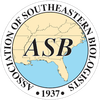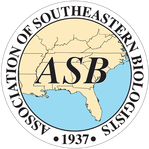85th ANNUAL MEETING OF ASB
CHATTANOOGA
MARCH 20 - MARCH 23, 2024
NOMINEES FOR ASB 2024 OFFICER ELECTIONS
The following individuals were nominated by ASB members and the ASB Nominations Committee and have agreed to serve in the indicated capacities if elected. Elections will take place online only. ASB Members will receive an electronic invitation to vote via SurveyMonkey. Each member is limited to a single vote through this e-invitation, and all voting will be anonymous. There are opportunities to indicate write-in candidates on the ballot. Voting for these elections will close during the 2024 Meeting in Chattanooga. Results of the election will be announced at the Awards Banquet.
NOMINEE FOR PRESIDENT-ELECT
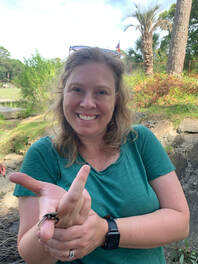
Heather Joesting, Georgia Southern University, Savannah, GA
Dr. Heather Joesting is an Associate Professor of Biology and Senior Scientist of the Sustainable Aquaponics Research Center at Georgia Southern University in Savannah. Heather received her B.S. in Environmental Science with a concentration in Biology from the University of North Carolina at Wilmington, M.S. in Environmental and Plant Biology from Ohio University, and Ph.D. in Biology from Wake Forest University. Prior to her position at Georgia Southern, Heather was a postdoctoral researcher at the University of Southern Mississippi’s Gulf Coast Research Laboratory. Her research program focuses on coastal plant ecology and sustainability, and her lab combines native plant nursery production for restoration with sustainable fish production through aquaponics. Research mentorship, both undergraduate and graduate students, is very important to Heather, and she has mentored over 50 undergraduate and 3 graduate students since 2013. She also teaches a range of courses at all levels, including environmental biology for non-majors, introductory biology, and upper-level major courses in Barrier Island Ecology, Plant Ecology, and Sustainable Agriculture. Heather has been attending ASB since 2014, bringing two or more students each year to present their research. Heather was a Member-At-Large on the ASB Executive Committee from 2020-2023 and currently serves as the Vice President of ASB, as well as the ASB Awards Coordinator and chair of the ASB Student Poster and Presentation Awards Committee and ASB and Affiliates Awards Committee. Heather would be honored to continue serving ASB as President-Elect.
Dr. Heather Joesting is an Associate Professor of Biology and Senior Scientist of the Sustainable Aquaponics Research Center at Georgia Southern University in Savannah. Heather received her B.S. in Environmental Science with a concentration in Biology from the University of North Carolina at Wilmington, M.S. in Environmental and Plant Biology from Ohio University, and Ph.D. in Biology from Wake Forest University. Prior to her position at Georgia Southern, Heather was a postdoctoral researcher at the University of Southern Mississippi’s Gulf Coast Research Laboratory. Her research program focuses on coastal plant ecology and sustainability, and her lab combines native plant nursery production for restoration with sustainable fish production through aquaponics. Research mentorship, both undergraduate and graduate students, is very important to Heather, and she has mentored over 50 undergraduate and 3 graduate students since 2013. She also teaches a range of courses at all levels, including environmental biology for non-majors, introductory biology, and upper-level major courses in Barrier Island Ecology, Plant Ecology, and Sustainable Agriculture. Heather has been attending ASB since 2014, bringing two or more students each year to present their research. Heather was a Member-At-Large on the ASB Executive Committee from 2020-2023 and currently serves as the Vice President of ASB, as well as the ASB Awards Coordinator and chair of the ASB Student Poster and Presentation Awards Committee and ASB and Affiliates Awards Committee. Heather would be honored to continue serving ASB as President-Elect.
NOMINEE FOR VICE PRESIDENT
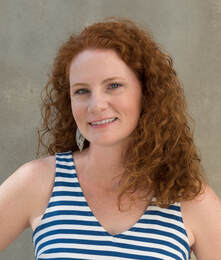
Lyndsay Rhodes, Florida Gulf Coast University, Fort Myers, FL
Dr. Lyndsay Rhodes is an Associate Professor in the Department of Biological Sciences at Florida Gulf Coast University in Fort Myers, Florida. She received her B.S. in Biology and B.A. in Psychology from Pfeiffer University (2004) and a Ph.D. in Biomedical Sciences from Tulane University School of Medicine (2010). She joined the faculty at Florida Gulf Coast University in 2014. Dr. Rhodes is a breast cancer biologist focused on identifying novel anti-cancer agents from natural products as well as understanding the signaling driving triple-negative breast cancer. She is an advocate for undergraduate research and has mentored over 65 undergraduate students in her research lab. She also developed and leads the Master’s Program in Biology at FGCU. Dr. Rhodes has published 42 peer-reviewed manuscripts and presented at numerous conferences. She has been a member of ASB since 2018 and has served as a Member-at-Large for the past 3 years. She has been a member of the Program Committee and several award committees of ASB as well. Dr. Rhodes is a Review editor for eBio, an official journal of ASB. She is committed to the success of ASB and furthering the development of our future scientists.
Dr. Lyndsay Rhodes is an Associate Professor in the Department of Biological Sciences at Florida Gulf Coast University in Fort Myers, Florida. She received her B.S. in Biology and B.A. in Psychology from Pfeiffer University (2004) and a Ph.D. in Biomedical Sciences from Tulane University School of Medicine (2010). She joined the faculty at Florida Gulf Coast University in 2014. Dr. Rhodes is a breast cancer biologist focused on identifying novel anti-cancer agents from natural products as well as understanding the signaling driving triple-negative breast cancer. She is an advocate for undergraduate research and has mentored over 65 undergraduate students in her research lab. She also developed and leads the Master’s Program in Biology at FGCU. Dr. Rhodes has published 42 peer-reviewed manuscripts and presented at numerous conferences. She has been a member of ASB since 2018 and has served as a Member-at-Large for the past 3 years. She has been a member of the Program Committee and several award committees of ASB as well. Dr. Rhodes is a Review editor for eBio, an official journal of ASB. She is committed to the success of ASB and furthering the development of our future scientists.
NOMINEE FOR SECRETARY
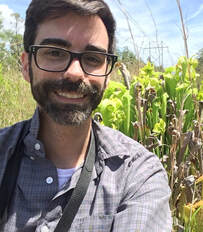
Jeremy D. Rentsch, Francis Marion University, Florence, SC
Dr. Jeremy D. Rentsch is an associate professor of Biology and Shirley Malloy chair of biology at Francis Marion University. He received his B.S. degree in Conservation Biology from Kent State University and Ph.D. in Plant Biology from University of Georgia. Prior to his faculty appointment at Francis Marion University, he spent two years as a post-doctoral researcher at University of Colorado Boulder. He has been a member of the faculty of Francis Marion University since the fall of 2015, where he teaches plant anatomy, plant genetics, and organismal biology. He is active in student research mentorship and cites it as the most rewarding part of his job. He has served for the Botanical Society of America’s southeastern section since 2018 – first as secretary / treasurer and most recently as chair. Additionally, he has served on ASB’s Committee on Human Diversity (CHD) for two years – the most recent year as chair.
Dr. Jeremy D. Rentsch is an associate professor of Biology and Shirley Malloy chair of biology at Francis Marion University. He received his B.S. degree in Conservation Biology from Kent State University and Ph.D. in Plant Biology from University of Georgia. Prior to his faculty appointment at Francis Marion University, he spent two years as a post-doctoral researcher at University of Colorado Boulder. He has been a member of the faculty of Francis Marion University since the fall of 2015, where he teaches plant anatomy, plant genetics, and organismal biology. He is active in student research mentorship and cites it as the most rewarding part of his job. He has served for the Botanical Society of America’s southeastern section since 2018 – first as secretary / treasurer and most recently as chair. Additionally, he has served on ASB’s Committee on Human Diversity (CHD) for two years – the most recent year as chair.
NOMINEE FOR ASSOCIATE TREASURER
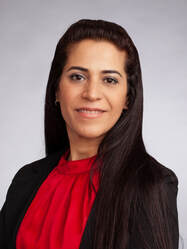
Sahar Hasim, Mercer University, Macon, GA
Dr. Sahar Hasim is an Assistant Professor specializing in Microbiology, Immunology, and Molecular biology at Mercer University. She holds a Ph.D. in Microbiology and Molecular Biology and a B.S. in Biological Sciences, both earned from the University of Nebraska-Lincoln.
Dr. Hasim's professional pursuits span a wide spectrum, focusing on understanding potential unmasking genes in fungal pathogens, Candida albicans and Candida auris, aiming to identify targets for drug development and enhance detection by innate immune cells. Her research endeavors extend to the exploration of biofilm formation on various nanomaterial coatings, the investigation of 2D materials-based biosensors for fungal detection, and an in-depth study of cell-to-cell communication.
Beyond her research commitments, Dr. Hasim is dedicated to education, actively participating in the teaching of various courses across different academic levels. Since 2020, Dr. Hasim has served as the Tri Beta advisor, fostering engagement with the student community.
Dr. Sahar Hasim is an Assistant Professor specializing in Microbiology, Immunology, and Molecular biology at Mercer University. She holds a Ph.D. in Microbiology and Molecular Biology and a B.S. in Biological Sciences, both earned from the University of Nebraska-Lincoln.
Dr. Hasim's professional pursuits span a wide spectrum, focusing on understanding potential unmasking genes in fungal pathogens, Candida albicans and Candida auris, aiming to identify targets for drug development and enhance detection by innate immune cells. Her research endeavors extend to the exploration of biofilm formation on various nanomaterial coatings, the investigation of 2D materials-based biosensors for fungal detection, and an in-depth study of cell-to-cell communication.
Beyond her research commitments, Dr. Hasim is dedicated to education, actively participating in the teaching of various courses across different academic levels. Since 2020, Dr. Hasim has served as the Tri Beta advisor, fostering engagement with the student community.
NOMINEES FOR MEMBERS-AT-LARGE (2 open seats)
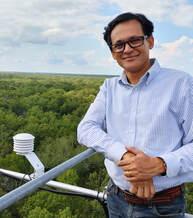
Joydeep Bhattacharjee, University of Louisiana, Monroe, Monroe, LA
Dr. Joydeep Bhattacharjee holds the esteemed Charles Allen Endowed Professorship in Biology within the School of Sciences at the University of Louisiana, Monroe. With a teaching career spanning over 17 years, he has seamlessly integrated teaching with extensive field research on both national and international fronts, garnering invaluable experience across diverse ecosystems.
As an ecologist, Dr. Bhattacharjee engages in a multifaceted array of research areas. This includes the intricate estimation of carbon and water fluxes at the ecosystem level. His technological expertise is evident in the use of advanced tools, such as Convolutional Neural Networks (CNN), for forest stress detection. His lab employs a fleet of Unmanned Aerial Vehicles (UAVs) equipped with multi and hyperspectral imaging capabilities, coupled with artificial intelligence for precise tree-species mapping and detection.
Beyond technology-driven research, Dr. Bhattacharjee explores the nuanced dynamics of bottomland hardwood forest succession and of riparian communities. His research reached new heights with a compelling project in the Himalayas, where both graduate and undergraduate students delve into the consequences of damming a swift-flowing river.
Notably, his commitment to fostering scientific knowledge extends to collaborations with several local schools in reshaping science education experience at the middle and high school levels. These efforts have been supported by numerous state and federal grants.
Under Dr. Bhattacharjee's mentorship, his students consistently showcase their research prowess at the Annual Meeting of the ABS since 2006. His contributions have not gone unnoticed, as evidenced by his receipt of university awards, including Outstanding Teacher, Best Researcher in the College of Arts, Education, and Sciences, and recognition for exemplary service at the college level.
Outside the academic realm, Dr. Bhattacharjee finds solace in diverse pursuits such as motorcycle riding, exploration of new destinations, and culinary art. These varied interests mirror the depth and breadth of his contributions to academia and the realm of scientific exploration.
Dr. Joydeep Bhattacharjee holds the esteemed Charles Allen Endowed Professorship in Biology within the School of Sciences at the University of Louisiana, Monroe. With a teaching career spanning over 17 years, he has seamlessly integrated teaching with extensive field research on both national and international fronts, garnering invaluable experience across diverse ecosystems.
As an ecologist, Dr. Bhattacharjee engages in a multifaceted array of research areas. This includes the intricate estimation of carbon and water fluxes at the ecosystem level. His technological expertise is evident in the use of advanced tools, such as Convolutional Neural Networks (CNN), for forest stress detection. His lab employs a fleet of Unmanned Aerial Vehicles (UAVs) equipped with multi and hyperspectral imaging capabilities, coupled with artificial intelligence for precise tree-species mapping and detection.
Beyond technology-driven research, Dr. Bhattacharjee explores the nuanced dynamics of bottomland hardwood forest succession and of riparian communities. His research reached new heights with a compelling project in the Himalayas, where both graduate and undergraduate students delve into the consequences of damming a swift-flowing river.
Notably, his commitment to fostering scientific knowledge extends to collaborations with several local schools in reshaping science education experience at the middle and high school levels. These efforts have been supported by numerous state and federal grants.
Under Dr. Bhattacharjee's mentorship, his students consistently showcase their research prowess at the Annual Meeting of the ABS since 2006. His contributions have not gone unnoticed, as evidenced by his receipt of university awards, including Outstanding Teacher, Best Researcher in the College of Arts, Education, and Sciences, and recognition for exemplary service at the college level.
Outside the academic realm, Dr. Bhattacharjee finds solace in diverse pursuits such as motorcycle riding, exploration of new destinations, and culinary art. These varied interests mirror the depth and breadth of his contributions to academia and the realm of scientific exploration.
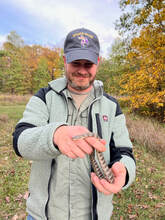
Patrick Cain, Defiance College, Defiance, OH
I am an assistant professor of biology at Defiance College in northwestern Ohio. I received my B.S. in Music and Biology at Central Michigan University, M.S. in Conservation Biology at Towson University, and Ph.D. in Ecology at Indiana State University. My interests in biology are highly varied. As an undergraduate, I developed my first project investigating agonistic behavior in male salamanders. Since then, I have researched the effects of commercial harvest practices of snapping turtles in Maryland, the evolution of signaling traits in lizards, as well as using mathematical models to predict the simultaneous behavioral sequences of patch choice in a game played by a predator and prey. I am also highly interested in developing software and hardware tools for use in biological research. For example, I have developed a robotic lizard to simulate the "push-up" behavior exhibited by male fence lizards, and I have also developed a low-cost GPS data logger for use on eastern box turtles. I have attended ASB the last two years, where I have given two full talks, two lightning talks, and two posters. I have also sought to enrich the experience for ASB attendees by hosting a Joro Spider Symposium that brought experts from all over the southeast together to discuss this new invasive threat, and a Build Your Own Field Gear workshop last year and planning on another in 2024. I find that ASB is an absolute gem of a meeting, and am thrilled to be nominated for a position that would allow me to contribute to its success in facilitating all the great things we discover as scientists.
I am an assistant professor of biology at Defiance College in northwestern Ohio. I received my B.S. in Music and Biology at Central Michigan University, M.S. in Conservation Biology at Towson University, and Ph.D. in Ecology at Indiana State University. My interests in biology are highly varied. As an undergraduate, I developed my first project investigating agonistic behavior in male salamanders. Since then, I have researched the effects of commercial harvest practices of snapping turtles in Maryland, the evolution of signaling traits in lizards, as well as using mathematical models to predict the simultaneous behavioral sequences of patch choice in a game played by a predator and prey. I am also highly interested in developing software and hardware tools for use in biological research. For example, I have developed a robotic lizard to simulate the "push-up" behavior exhibited by male fence lizards, and I have also developed a low-cost GPS data logger for use on eastern box turtles. I have attended ASB the last two years, where I have given two full talks, two lightning talks, and two posters. I have also sought to enrich the experience for ASB attendees by hosting a Joro Spider Symposium that brought experts from all over the southeast together to discuss this new invasive threat, and a Build Your Own Field Gear workshop last year and planning on another in 2024. I find that ASB is an absolute gem of a meeting, and am thrilled to be nominated for a position that would allow me to contribute to its success in facilitating all the great things we discover as scientists.

Elyse Donaubauer, Lander University, Greenwood, SC
Dr. Elyse Donaubauer is an Assistant Professor of Biology at Lander University. Elyse received a dual B.S. in Cellular and Molecular Biology and Biochemistry from the University of Wisconsin – La Crosse, a Ph.D. in Molecular Biosciences with a concentration in Reproductive Signaling from Washington State University. Following graduate school, she was a postdoctoral researcher at Case Western Reserve University and the Cleveland Clinic studying the signaling involved in therapeutic resistance in triple negative breast cancer. Her research program at Lander University focuses on the role of Src Family Kinase members in zebrafish development. Students in her lab look at the changes in gene and protein expression that are necessary for embryo development, becoming proficient in multiple molecular laboratory techniques. Undergraduate research is an essential experience, and she is excited to work with new and returning undergraduate students each year. Elyse also teaches a variety of courses, including as Human Physiology, Animal Physiology, and Molecular Genetics. Elyse attended her first ASB Annual meeting last year in 2023 and is excited for the opportunity to become more involved in the organization as an At Large member.
Dr. Elyse Donaubauer is an Assistant Professor of Biology at Lander University. Elyse received a dual B.S. in Cellular and Molecular Biology and Biochemistry from the University of Wisconsin – La Crosse, a Ph.D. in Molecular Biosciences with a concentration in Reproductive Signaling from Washington State University. Following graduate school, she was a postdoctoral researcher at Case Western Reserve University and the Cleveland Clinic studying the signaling involved in therapeutic resistance in triple negative breast cancer. Her research program at Lander University focuses on the role of Src Family Kinase members in zebrafish development. Students in her lab look at the changes in gene and protein expression that are necessary for embryo development, becoming proficient in multiple molecular laboratory techniques. Undergraduate research is an essential experience, and she is excited to work with new and returning undergraduate students each year. Elyse also teaches a variety of courses, including as Human Physiology, Animal Physiology, and Molecular Genetics. Elyse attended her first ASB Annual meeting last year in 2023 and is excited for the opportunity to become more involved in the organization as an At Large member.
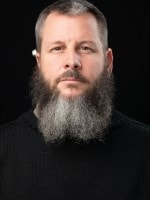
Matt C. Estep, Appalachian State University, Boone, NC
Matt C. Estep is an Associate Professor of Biology at Appalachian State University. Matt earned his B.S. (1999) and M.S. (2001) at Appalachian State University in Biology and his Ph.D. in Plant Biology from the University of Georgia (2010). Matt is a plant geneticist and studies evolutionary processes at the genomic and species level. His dissertation focused on developing genetic resources for the genus Striga (Orobanchaceae) in Western Africa. His post-doctoral work focused on the systematics of the grass tribe Andropogoneae (Poaceae). His current research focuses on conservation genetics of rare and threatened species within the Amphibolite Mountains and Western North Carolina. Matt is also the Treasurer for the Southern Appalachian Botanical Society, A member-at-Large for the Friends of Plant Conservation, and a board member for the Plant Conservation Program in North Carolina.
Matt C. Estep is an Associate Professor of Biology at Appalachian State University. Matt earned his B.S. (1999) and M.S. (2001) at Appalachian State University in Biology and his Ph.D. in Plant Biology from the University of Georgia (2010). Matt is a plant geneticist and studies evolutionary processes at the genomic and species level. His dissertation focused on developing genetic resources for the genus Striga (Orobanchaceae) in Western Africa. His post-doctoral work focused on the systematics of the grass tribe Andropogoneae (Poaceae). His current research focuses on conservation genetics of rare and threatened species within the Amphibolite Mountains and Western North Carolina. Matt is also the Treasurer for the Southern Appalachian Botanical Society, A member-at-Large for the Friends of Plant Conservation, and a board member for the Plant Conservation Program in North Carolina.
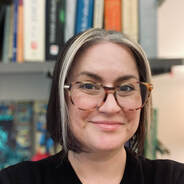
Jennifer Hurst-Kennedy, Agnes Scott College, Decatur, GA
Dr. Jennifer Hurst-Kennedy is an Associate Professor of Medical Sciences in the Graduate Studies division at Agnes Scott College in Decatur, GA. She earned her doctorate in Applied Biology from the Georgia Institute of Technology and her bachelor’s in Biochemistry and Molecular Biology from the University of Georgia. Dr. Hurst-Kennedy is an experienced science educator who is passionate about providing quality, accessible education to all students. At Agnes Scott College, she teaches a variety of courses, including general biology, biotechnology, biochemistry, and cancer biology. Her research centers on the science of teaching and learning and cancer biology. As an ASB member since 2014, she and her students regularly attend and present their work at annual meetings.
Dr. Jennifer Hurst-Kennedy is an Associate Professor of Medical Sciences in the Graduate Studies division at Agnes Scott College in Decatur, GA. She earned her doctorate in Applied Biology from the Georgia Institute of Technology and her bachelor’s in Biochemistry and Molecular Biology from the University of Georgia. Dr. Hurst-Kennedy is an experienced science educator who is passionate about providing quality, accessible education to all students. At Agnes Scott College, she teaches a variety of courses, including general biology, biotechnology, biochemistry, and cancer biology. Her research centers on the science of teaching and learning and cancer biology. As an ASB member since 2014, she and her students regularly attend and present their work at annual meetings.
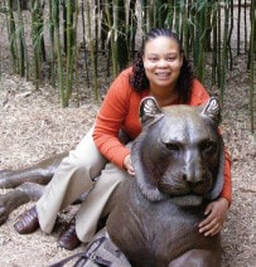
Andrea L. Moore, Savannah State University, Savannah, GA
Dr. Andrea L. Moore is an Associate Professor of Biology at Savannah State University in Savannah, GA. Andrea earned a B.S. in Environmental Science from Savannah State University, an interdisciplinary M.S. in Math and Physics from Andrews University, and a Ph.D. in Environmental Science with a specialization in Environmental Education from Oklahoma State University. Her prior research experience includes utilizing differential equations to model diurnal activities of shorebirds, and utilizing ecological techniques to examine the influence of environmental justice policy on placement of Toxic Release Inventory Facilities. She has over 10 years teaching experience in higher education and her research current research focuses on the utilization of course embedded research experiences (CUREs) in undergraduate biology lab courses to develop scientific research and quantitative analysis skills. As an ecologist, the student research projects span areas of community ecology and plant physiology (namely photosynthesis). She has served in several service roles at her institution including Faculty Senate President, Faculty Secretary, Faculty Handbook Committee Chairperson, among other duties and currently added coordinator of freshman year experience. She joined ASB in 2017 and has presented on her research there.
Dr. Andrea L. Moore is an Associate Professor of Biology at Savannah State University in Savannah, GA. Andrea earned a B.S. in Environmental Science from Savannah State University, an interdisciplinary M.S. in Math and Physics from Andrews University, and a Ph.D. in Environmental Science with a specialization in Environmental Education from Oklahoma State University. Her prior research experience includes utilizing differential equations to model diurnal activities of shorebirds, and utilizing ecological techniques to examine the influence of environmental justice policy on placement of Toxic Release Inventory Facilities. She has over 10 years teaching experience in higher education and her research current research focuses on the utilization of course embedded research experiences (CUREs) in undergraduate biology lab courses to develop scientific research and quantitative analysis skills. As an ecologist, the student research projects span areas of community ecology and plant physiology (namely photosynthesis). She has served in several service roles at her institution including Faculty Senate President, Faculty Secretary, Faculty Handbook Committee Chairperson, among other duties and currently added coordinator of freshman year experience. She joined ASB in 2017 and has presented on her research there.
Election Timeline
Jan 17th: Nominee biographies available online and last call for nominees.
Feb 14th: Voting opens
Mar 21st: Voting closes (during the Annual Meeting)
Mar 22nd: New officers announced at the Awards Banquet
Mar 23rd: First meeting of the new Executive Committee
See other important dates on our Calendar.
Some Important Links
Roles of each member of the Executive Committee
Current members of the Executive Committee
Jan 17th: Nominee biographies available online and last call for nominees.
Feb 14th: Voting opens
Mar 21st: Voting closes (during the Annual Meeting)
Mar 22nd: New officers announced at the Awards Banquet
Mar 23rd: First meeting of the new Executive Committee
See other important dates on our Calendar.
Some Important Links
Roles of each member of the Executive Committee
Current members of the Executive Committee
